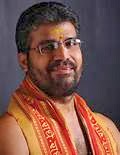The Process of Yoga : 3-10. Swami Krishnananda.
Swami Chinmayananda :
Did you know about this??
* Too much study of religious books is also an impure Vasana. This is Sastra Vasana. Certainly, Atman or God can hardly be found in books. Some people have got passion for study of religious books. They do not take recourse to practical spiritual Sadhana. They spend their lives in the study of religious books. They are bookworms. The Sastras are endless. Life is short. There are many obstacles. Therefore, take out the essence and assimilate it.
Tell us in the comments which of these vasana or tendency is powerful in you? Tag your friends or family so that they know it too!
=========================================================================
Sunday, 25 Jun, 2023. 05:30.
Chapter 3: Recognising the Independent Status of Things-10.
========================================================================
Remember that the world and the subject have proceeded as two channels from the same source, so that when we touch one element, the other elements are automatically touched. When we touch one branch of a tree, it is like touching the whole tree. When we touch our finger, we have touched our body. Similarly, when we touch the Self, we touch the whole cosmos. It is the switchboard of the whole universe.
You may ask why the Self should be touched rather than the object. Why do we not try to control the object outside rather than the Self, the subject? The reason is that the character of reality is selfhood, and not the object. The Self is incapable of externalisation into objectivity, inasmuch as its nature is consciousness. Chit, or chaitanya, is the nature of the Self, and it cannot be externalised. However much we may differentiate it into the object, it refuses to become differentiated because it is the nature of consciousness to maintain the status of Selfhood, Atmattva.
Therefore, the Supreme Atman is called the Paramatman. The Paramatman is another name that we give to the Atman of the cosmos. While the individual self is called the jiva, the Supreme Self is called the Paramatman, the Oversoul or the Overself. By control of the jiva, we enter into the Atman of the individual. By the entry of consciousness into itself in the affirmation of the Atman within, it has simultaneously entered into the Atman of the cosmos. So, Atma-sakshatkara is the same as Paramatma-sakshatkara; Self-realisation and God-realisation mean one and the same thing. Self-discipline is world-discipline; Self-mastery is world-mastery; Self-knowledge is world-knowledge or omniscience.
This is the nature of God. God is omniscient, omnipresent and omnipotent because He is the Self of all things – not merely of the subjective side of things, but also the objective side of things. While we experience the consciousness aspect of the subject, we do not experience the consciousness aspect of the object because we always make the mistake of thinking that the object is outside us. There is a sea of consciousness within us, and when we enter into that sea of consciousness we have entered into the manifestations of it in various forms at the same time.
To reiterate what I said in the previous session, this is spaceless and timeless experience. This is not an experience that takes place in the future or in a distant place in the expanse of space. It is a totality, a simultaneity, an instantaneity. That is all we can say about it, for which we have to strive by subduing ourselves to such an extent that our individuality is abolished completely and we remain what we were originally, prior to our manifestation as jivas, at the point of creation.
Chapter 3, Ends.
Next
Chapter 4: The Psychology of Yoga
To be continued
========================================================================







.jpg)



Comments